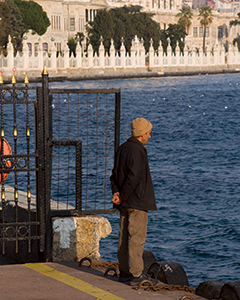Beşiktaş
 The palace in the background here on the European shore of the Bosporus (the Dolmabahçe Sarayi) represents an anomaly in modern history, in that Mustafa Kemal Atatürk died here on 10 November, 1938, and left his country a social and political legacy that persists to this day.
The palace in the background here on the European shore of the Bosporus (the Dolmabahçe Sarayi) represents an anomaly in modern history, in that Mustafa Kemal Atatürk died here on 10 November, 1938, and left his country a social and political legacy that persists to this day.
Vladimir Ilyich Lenin’s vision for the Soviet Union barely outlasted his death in 1924. The Germany that followed Adolf Hitler was fortunately the same middle class society that preceded him. The Franklin Roosevelt administration might have transformed America into a statist, socially mature society, but then Roosevelt had plenty of support for his views. Atatürk was too far ahead of his time to derive much support from anywhere except his own iron will and vitality, and yet, in just fifteen years, he turned Turkey and its history and culture upside down. And happily for everyone, it has stayed that way.
It is near-impossible to grasp the catastrophe Atatürk inherited. The Ottoman Empire had long collapsed into a vicious, empty shell, easily manipulated by outsiders, and in which the Turk found himself a second-class citizen. Atatürk started out in the Army, a complete mess if ever there was one, and yet with brilliant generalship, managed to defeat the best of the British Empire at Gallipoli. His secret there, as later in his politics, was that he possessed a unique understanding of the Turk and all his strengths and weaknesses. All of Atatürk’s successes built on this foundation at a time when most of the world and even his own countrymen had written off Turks and Turkish society as hopelessly lost.
To the extent that history is a product of personality, many of Atatürk’s policies originated from the simple love of a good fight. One fight he picked with his country was over all forms of religious dress, which he banned out of hand. Not just the headscarf people are still fighting over, but the Fez, the veil, and anything else he took as evidence of the slave mentality he intended to strip from his people’s collective consciousness. For the same reasons, he fully and instantly emancipated women long before more so-called progressive societies got around to fulfilling their wartime promises.
Not everything was perfection–Atatürk couldn’t spell economics, and many of the other ethnic groups who populated the Anatolian and Thracian geography had reason to regret the Turk’s ascendancy. The polyglot Constantinople Atatürk inherited was probably more interesting than the more homogenous Istanbul he left behind. And all of the battles it took to free and transform the country involved far too much bloodshed all around. Yet the result is evident to anyone who visits Turkey, one of the few stable and successful societies and democracies in this part of the world.
As Atatürk himself once told a friend and aide, not bad for a Macedonian drunkard with a weakness for Raki and loose women.
Filed under: Travels Tagged: Travel, Turkey




